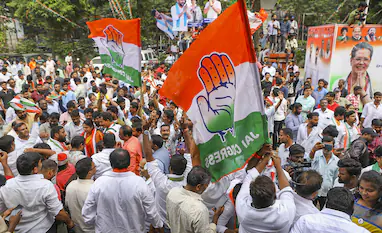New Delhi, June 12, 2025 — A fresh political controversy has erupted in the capital as the Indian National Congress launched a strong protest against what it calls a “deliberate erosion of transparency” in the country’s electoral process. The protest follows recent administrative moves that limit public and opposition access to key election-related documents, including voter roll revisions, audit trails, and communications between the Election Commission and the central government.
Congress leaders accused the government of undermining democratic accountability and demanded an immediate rollback of the restrictions. They claim the changes were introduced quietly through procedural guidelines without parliamentary scrutiny or public debate.
“This is a blow to democracy,” says Congress
Addressing a press conference at the All India Congress Committee (AICC) headquarters, senior party leader Jairam Ramesh said:
“Free and fair elections depend on transparency. Restricting access to electoral data is a dangerous step toward democratic backsliding. What is the government trying to hide?”
Party president Mallikarjun Kharge also voiced concern, warning that such actions only deepen mistrust in the electoral process, especially following allegations of irregularities in recent state polls.
What’s Restricted?
The restrictions reportedly involve:
-
Tightened rules for accessing Form 17C (used for recording votes polled at each polling station)
-
Limiting public access to VVPAT (Voter Verified Paper Audit Trail) records
-
Denial of RTI (Right to Information) requests related to certain electoral communications
-
Reduced access to archived reports on electoral roll cleansing and error corrections
While the Election Commission has defended the move as an “administrative streamlining” to avoid misuse or misinterpretation of technical data, opposition parties view it as a strategic attempt to evade scrutiny.
Protests and Public Response
The Congress organized a peaceful sit-in outside the Election Commission of India office, demanding that all election documents remain publicly accessible under RTI provisions. Protesters carried placards that read, “Democracy Dies in Darkness” and “Restore Poll Transparency.”
Civil society groups and election watchdogs have also voiced concern. The Association for Democratic Reforms (ADR) issued a statement urging the Election Commission to remain impartial and uphold the public’s right to scrutinize elections.
Government’s Response
As of now, the central government has not issued an official statement in response to the protests. However, sources close to the Ministry of Law and Justice argue that the reforms are meant to prevent “misinformation campaigns” and ensure that technical documents aren’t “politically weaponized.”
What’s Next?
Congress is planning to escalate the issue during the upcoming Monsoon Session of Parliament, where they are expected to call for a debate on electoral transparency and seek clarity from the Election Commission.
“Democracy can’t survive behind closed doors,” said Congress MP Shashi Tharoor. “We will fight this in Parliament, in courts, and among the people.”
As India prepares for its next round of key elections, the demand for electoral transparency is once again at the center of the nation’s democratic discourse.






